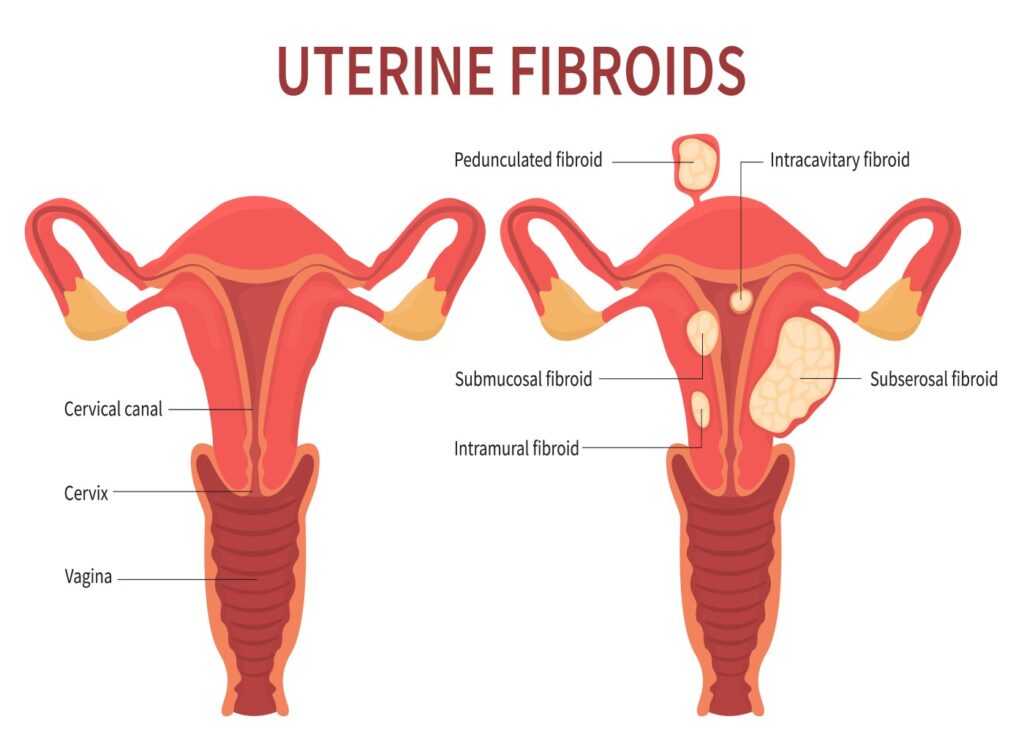Uterine Fibroids

Uterine Fibroids
Uterine fibroids are non-cancerous growths that develop in or on the uterus. They are very common, affecting up to 70-80% of women at some point in their lives, especially during their reproductive years. While many women with fibroids experience no symptoms, they can lead to various health issues, including heavy menstrual bleeding, pelvic pain, and infertility. At Dr. Surbhi Bhargava’s clinic, we offer personalized care and treatment options for women suffering from uterine fibroids to help manage symptoms and improve overall well-being.
Types of Uterine Fibroids:
Fibroids vary in size and location within the uterus and are classified as:
Submucosal fibroids: Located just beneath the uterine lining, they can affect menstrual bleeding and fertility.
Intramural fibroids: Found within the uterine wall, these are the most common type and can lead to heavy periods and pelvic pressure.
Subserosal fibroids: Found on the outer wall of the uterus, they may cause pain and discomfort but rarely affect menstrual cycles.
Pedunculated fibroids: These grow on a stalk-like structure and can twist or cause pain if they become twisted.
Symptoms of Uterine Fibroids:
While some women may have fibroids without any symptoms, others may experience:
Heavy or prolonged menstrual bleeding
Pelvic pressure or pain
Frequent urination or difficulty emptying the bladder
Pain during intercourse
Lower back or leg pain
Abdominal bloating or enlargement
Infertility or complications during pregnancy
If you experience any of these symptoms, it’s important to seek medical advice for evaluation and appropriate management.
Diagnosis:
Dr. Surbhi Bhargava uses a combination of clinical evaluation and diagnostic tests to confirm the presence of fibroids:
Pelvic exam to check for abnormalities
Ultrasound to visualize the fibroids and assess their size and location
MRI in certain cases to get a detailed image of the fibroids
Treatment Options:
Treatment for uterine fibroids depends on the severity of symptoms, the size of the fibroids, and whether the woman plans to have children. Options may include:
Medications to manage symptoms (e.g., hormonal treatments, pain relievers)
Uterine artery embolization (UAE): A minimally invasive procedure that cuts off blood supply to the fibroids, causing them to shrink
Myomectomy: Surgical removal of the fibroids while preserving the uterus
Hysterectomy: Removal of the uterus, typically for women who no longer wish to have children and have severe symptoms
Compassionate Care by Dr. Surbhi Bhargava
With extensive experience in treating various gynecological conditions, Dr. Surbhi Bhargava provides expert care for women with uterine fibroids. She tailors treatment plans to meet each patient’s individual needs, ensuring the best possible outcomes for long-term health and fertility.
If you suspect you have uterine fibroids or need advice on managing symptoms, schedule a consultation with Dr. Surbhi Bhargava for compassionate and expert care.